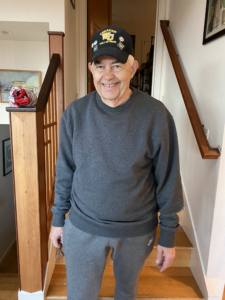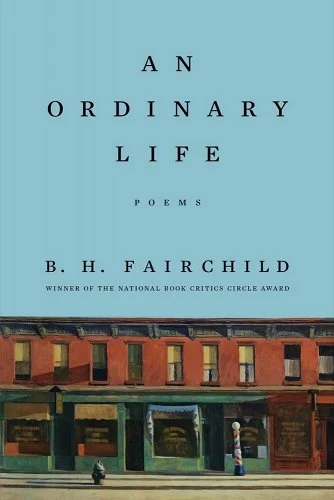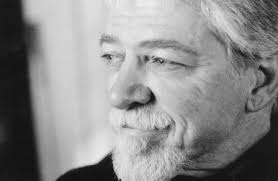 Today, after a year of shutdown, Larry’s senior softball team finally gets to play. Here he is in his championship hat. Yay!
Today, after a year of shutdown, Larry’s senior softball team finally gets to play. Here he is in his championship hat. Yay!
To celebrate, a long poem by B.H. Fairchild, that master of the long poem:
Body and Soul
Half-numb, guzzling bourbon and Coke from coffee mugs,
our fathers fall in love with their own stories, nuzzling
the facts but mauling the truth, and my friend’s father begins
to lay out with the slow ease of a blues ballad a story
about sandlot baseball in Commerce, Oklahoma decades ago.
These were men’s teams, grown men, some in their thirties
and forties who worked together in zinc mines or on oil rigs,
sweat and khaki and long beers after work, steel guitar music
whanging in their ears, little white rent houses to return to
where their wives complained about money and broken Kenmores
and then said the hell with it and sang Body and Soul
in the bathtub and later that evening with the kids asleep
lay in bed stroking their husband’s wrist tattoo and smoking
Chesterfields from a fresh pack until everything was O.K.
Well, you get the idea. Life goes on, the next day is Sunday,
another ball game, and the other team shows up one man short.
They say, we’re one man short, but can we use this boy,
he’s only fifteen years old, and at least he’ll make a game.
They take a look at the kid, muscular and kind of knowing
the way he holds his glove, with the shoulders loose,
the thick neck, but then with that boy’s face under
a clump of angelic blonde hair, and say, oh, hell, sure,
let’s play ball. So it all begins, the men loosening up,
joking about the fat catcher’s sex life, it’s so bad
last night he had to hump his wife, that sort of thing,
pairing off into little games of catch that heat up into
throwing matches, the smack of the fungo bat, lazy jogging
into right field, big smiles and arcs of tobacco juice,
and the talk that gives a cool, easy feeling to the air,
talk among men normally silent, normally brittle and a little
angry with the empty promise of their lives. But they chatter
and say rock and fire, babe, easy out, and go right ahead
and pitch to the boy, but nothing fancy, just hard fastballs
right around the belt, and the kid takes the first two
but on the third pops the bat around so quick and sure
that they pause a moment before turning around to watch
the ball still rising and finally dropping far beyond
the abandoned tractor that marks left field. Holy shit.
They’re pretty quiet watching him round the bases,
but then, what the hell, the kid knows how to hit a ball,
so what, let’s play some goddamned baseball here.
And so it goes. The next time up, the boy gets a look
at a very nifty low curve, then a slider, and the next one
is the curve again, and he sends it over the Allis Chalmers,
high and big and sweet. The left field just stands there, frozen.
As if this isn’t enough, the next time up he bats left-handed.
They can’t believe it, and the pitcher, a tall, mean-faced
man from Okarche who just doesn’t give a shit anyway
because his wife ran off two years ago leaving him with
three little ones and a rusted-out Dodge with a cracked block,
leans in hard, looking at the fat catcher like he was the sonofabitch
who ran off with his wife, leans in and throws something
out of the dark, green hell of forbidden fastballs, something
that comes in at the knees and then leaps viciously towards
the kid’s elbow. He swings exactly the way he did right-handed
and they all turn like a chorus line toward deep right field
where the ball loses itself in sagebrush and the sad burnt
dust of dustbowl Oklahoma. It is something to see.
But why make a long story long: runs pile up on both sides,
the boy comes around five times, and five times the pitcher
is cursing both God and His mother as his chew of tobacco sours
into something resembling horse piss, and a ragged and bruised
Spalding baseball disappears into the far horizon. Goodnight,
Irene. They have lost the game and some painful side bets
and they have been suckered. And it means nothing to them
though it should to you when they are told the boy’s name is
Mickey Mantle. And that’s the story, and those are the facts.
But the facts are not the truth. I think, though, as I scan
the faces of these old men now lost in the innings of their youth,
it lying there in the weeds behind that Allis Chalmers
just waiting for the obvious question to be asked: why, oh
why in hell didn’t they just throw around the kid, walk him,
after he hit the third homer? Anybody would have,
especially nine men with disappointed wives and dirty socks
and diminishing expectations for whom winning at anything
meant everything. Men who knew how to play the game,
who had talent when the other team had nothing except this ringer
who without a pitch to hit was meaningless, and they could go home
with their little two-dollar side bets and stride into the house
singing If You’ve Got the Money, Honey, I’ve Got the Time
with a bottle of Southern Comfort under their arms and grab
Dixie or May Ella up and dance across the gray linoleum
as if it were V-Day all over again. But they did not
And they did not because they were men, and this was a boy.
And they did not because sometimes after making love,
after smoking their Chesterfields in the cool silence and
listening to the big bands on the radio that sounded so glamorous,
so distant, they glanced over at their wives and noticed the lines
growing heavier around the eyes and mouth, felt what their wives
felt: that Les Brown and Glenn Miller and all those dancing couples
and in fact all possibility of human gaiety and light-heartedness
were as far away and unreachable as Times Square or the Avalon
ballroom. They did not because of the gray linoleum lying there
in the half-dark, the free calendar from the local mortuary
that said one day was pretty much like another, the work gloves
looped over the doorknob like dead squirrels. And they did not
because they had gone through a depression and a war that had left
them with the idea that being a man in the eyes of their fathers
and everyone else had cost them just too goddamn much to lay it
at the feet of a fifteen year-old-boy. And so they did not walk him,
and lost, but at least had some ragged remnant of themselves
to take back home. But there is one thing more, though it is not
a fact. When I see my friend’s father staring hard into the bottomless
well of home plate as Mantle’s fifth homer heads toward Arkansas,
I know that this man with the half-orphaned children and
worthless Dodge has also encountered for the first and possibly
only time the vast gap between talent and genius, has seen
as few have in the harsh light of an Oklahoma Sunday, the blonde
and blue-eyed bringer of truth, who will not easily be forgiven.
B. H. Fairchild

 Today, after a year of shutdown, Larry’s senior softball team finally gets to play. Here he is in his championship hat. Yay!
Today, after a year of shutdown, Larry’s senior softball team finally gets to play. Here he is in his championship hat. Yay!

